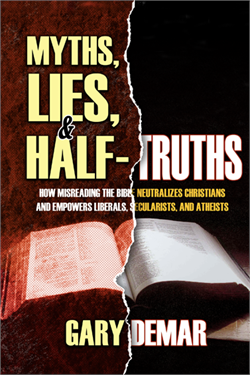In this first part of a recent talk, Gary discusses the worldview implications of Bible prophecy.
Biblical Christianity has always been historical. The early creeds of the Church are simply recitals of the history of Jesus’s birth, death, and resurrection. These all occurred on earth, in history (Luke 1:1–4; 2:1–2; 3:1–2). It would be more than strange if the King had come to earth, died on earth, rose from the dead so He could establish a kingdom that has nothing to do with the world He came to redeem. Why did Jesus become flesh and enter human history? The answer of Scripture is that He came to redeem what was fallen. He came into the world to redeem the world. He came into the world to establish His redemptive reign among men and women on earth who need redemption.
Moreover, several passages explicitly claim that Jesus exercises dominion on earth. Jesus claimed that He had been given all authority in heaven and on earth (Matt. 28:18–20). Paul wrote to the Colossians that Jesus, the Creator of all things, had come to earth to restore all things (Col. 1:16). Jesus’ rule is as extensive as creation itself. People enter the kingdom (1:13). When Jesus gave Peter the keys of the kingdom, He told him that they were for the binding and loosing of things both in heaven and on earth (Matt. 16:19). The signs of the coming of the kingdom in Jesus’ ministry affected people this side of heaven. Jesus exhorted His followers to pursue the righteousness of the kingdom (6:33), a righteousness manifested visibly and historically in acts of charity and justice. Though the operation of the kingdom is Spiritual, and though our King sits on a heavenly throne, His rule nevertheless has visible, historical, and earthly implications.
But we cannot stop with individual submission to Jesus. We must also submit our families to His rule by acknowledging that Jesus rules our homes. Families that rebel against Him will be judged, unto the third and fourth generations. When families come under Jesus’ gracious rule, they receive His blessing, and commit themselves to live by His standards for family life. Husbands must love their wives, wives must submit themselves to their husbands, and children must be obedient to their parents (Eph. 5:22–6:4). In this way, Jesus’ rule is acknowledged and progressively manifested in our homes. As the gospel is preached to all creatures, more families will enjoy the blessings of Jesus’ rule.
Jesus is King over all civil officials and their governments as “King of kings and the Lord of lords” (1 Tim. 6:15; Rev. 11:15; 19:16). Civil officials must acknowledge the Lordship of Jesus and obey His rules for civil governments (Psalm 2:10–12; Rom. 13:1–4). The blessings of the kingdom—peace, stability, and justice—will come to all nations that acknowledge the King and pattern their ways after His laws.

Myths, Lies, and Half-Truths
The rejection of any type of "this-worldly" application of the Bible has resulted in the proliferation of man-centered worldviews that have steadily drained the life out of our world and left behind a spiritual vacuum. Will the church of Jesus Christ be prepared with biblical answers for the millions who will be ready to follow the light of the gospel as the folly of humanism is made manifest? (2 Tim. 3:9).
Buy NowIn this first part of a recent talk, Gary discusses the worldview implications of Bible prophecy. Many Christians will claim that what we believe about the future doesn’t matter, because “God wins” anyway. Gary disagrees that it doesn’t matter and gives cultural, theological, and historical reasons why.

